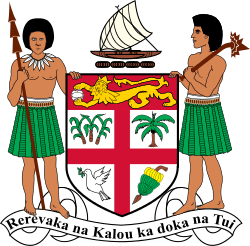Fijian general election, 1963
 |
|---|
| This article is part of a series on the politics and government of Fiji |
|
Legislative
|
|
Judiciary |
|
General elections were held in Fiji between 17 April and 4 May 1963. For the first time, indigenous Fijians were given the right to vote alongside the European and Indo-Fijian population.
Electoral system
In 1963, the first significant changes were carried out to the composition of the Legislative Council of Fiji since 1937. The Council was expanded to 37 members, of which 19 were official members (usually heads of Government departments) and 18 unofficial members, retaining the official majority. Of the unofficial members, 12 were elected, four from each of the Fijian, Indian and European groups; the four Fijian and Indian members were elected from single member constituencies, whilst the European electorate had two single-member constituencies (Northern and Suva) and one two-member constituency (Southern). The Governor nominated a further two members from each of the communities. The Legislative Councillors of each race were permitted to select two of their members to the Executive Council.
Qualifications to register as a voter were as follows:
- British subject
- Age of twenty-one years or over
- Resident in the colony for a period of, or periods amounting in the aggregate of, not less than twelve months out of the preceding three years.
- Ability to read and write a simple sentence and sign one’s name in the English language in the case of a European, in either English or Fijian in the case of a Fijian, and for an Indian either in English, Hindi, Urdu, Tamil, Telugu, Gurmukhi, Gujarati or Malayalam. "European" and "Indian" were defined as a person whose father or any of whose male progenitors in the male line was a European or Indian, respectively, while a "Fijian" was defined as "a person whose father or any of whose progenitors in the male line ... was an aboriginal native of the colony, excluding the island of Rotuma and its dependencies."
Although ethnic Fijians and women gained the right to vote, illiterate adults were not permitted to vote. Some people could choose between ethnic rolls and no provision was made for Rotumans, Pacific Islanders, Chinese and part-Chinese to vote. Voter registration took place between 1 July and 30 September 1962,[1] with 52,935 Fijians, 36,137 Indians and 4,526 Europeans registering.[2]
There was also a number of changes to qualifications for candidates to run for office. Indian and European civil servants were prohibited from nominating as candidates, but this provision did not apply to Fijians as there were few qualified Fijians outside the civil service. Candidates were required, not only to be eligible to be registered as a voter, but to be actually registered. This provision disqualified Ayodhya Prasad as he was out of the country during the registration period.
Campaign
Most candidates contested the election as independents, although the Citizens Federation (which became the Federation Party in 1964) endorsed A. D. Patel, S.M. Koya and James Madhavan, while the Kisan Sangh endorsed Deo Sharma, James Shankar Singh and Harsih Chandra Kohli respectively as their opponents. The Western Democratic Party nominated Apisai Tora and Isikeli Nadalo, both for the Western Fijian Constituency. Isikei Nadalo was also endorsed by Fijian National Party.
Results
There were two significant outcomes of the elections; the secret ballot amongst Fijians led to the consolidation of the power of the Fijian establishment, notably in the Western Fijian Constituency, where the Tovata high chief, Ratu Penaia Ganilau won by 7,347 votes against local commoners Apisai Tora (1,496 votes) and Isikeli Nadalo (659 votes). In the Indian community, voters in the sugar cane districts clearly endorsed the policies of the Federation led by A.D. Patel over those of the Kisan Sangh, by electing its three candidates; A.D. Patel defeated Deo Sharma by 6,244 votes to 3,346 votes, S.M. Koya defeated James Shankar Singh by 3,998 votes to 3,480 votes and James Madhavan defeated Harish Chandra Kohli by 2,753 vote to 2,175 votes.
| Constituency | Candidate | Votes | % | Notes |
|---|---|---|---|---|
| European seats | ||||
| Northern (876 registered) | F.G. Archibald | 358 | Elected | |
| Harold Gibson | 341 | |||
| Southern (969 registered) | John Kearsley | 388 | Elected | |
| Douglas Brown | 375 | |||
| Archibald Gardner | 25 | |||
| Suva (1,634 registered) | Neil Falvey | Uncontested | Elected | |
| Western (1,047 registered) | Ronald Kermode | 573 | Elected | |
| Samuel Berwick | 296 | |||
| Source: Meller & Anthony | ||||